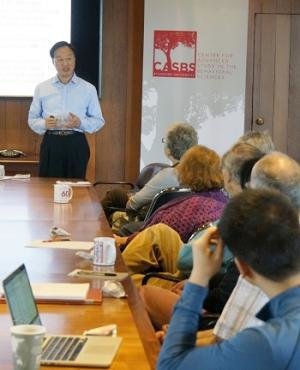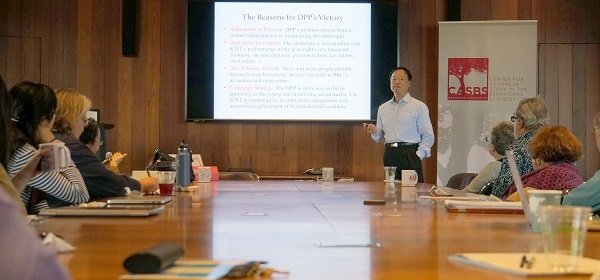
On January 16, 2016, Taiwan held general elections in which Tsai Ing-wen, leader of the Democratic Progressive Party (DPP) ascended to the Presidency with 56.1% of the popular vote. The DPP also secured a majority in Taiwan’s legislature, marking the first time the DPP won both the presidency and a majority in the legislature, as well as the first time the historically-dominant Kuomintang (KMT) party lost its majority in the legislature.
What are the implications of the recent Taiwanese elections for cross-strait relations with China? What opportunities and challenges do these developments present for U.S.-Taiwan relations?
Yi-huah Jiang, a 2015-16 CASBS fellow, is a unique blend of scholar-practitioner who is perfectly positioned to answer such questions and elucidate the issues. Jiang earned a PhD in political science at Yale University and spent nearly two decades teaching political philosophy at the National Taiwan University (NTU). He entered the political arena in 2008, serving as Minister of Research, Development and Evaluation (2008-2009); Minster of the Interior (2009-2012); Vice Premier (2012-2013); and finally Premier (February 2013- December 2014).
On February 9, Dr. Jiang provided a lucid, in-depth analysis of the Taiwan elections for CASBS fellows and staff, followed by a Q&A session. The presentation put a spotlight on the domestic and international dynamics of Taiwanese politics that the CASBS crowd found highly illuminating.
The presentation served as excellent preparation for a series of appearances in Washington, D.C., in mid-March. While there, Jiang delivered a keynote lecture and participated in a panel discussion at a public affairs forum on Capitol Hill sponsored by the Institute for Taiwan-American Studies. He also conducted seminars at well-known think tanks such as the American Enterprise Institute and Heritage Foundation. In addition, several Chinese and Taiwanese media outlets, as well as the Voice of America, interviewed Jiang in Chinese-language format.
Many of Dr. Jiang’s appearances, including the one at CASBS, relied on an insightful slide presentation that elevated his analysis. Jiang graciously provided it to CASBS for readers’ benefit. View the presentation here.
"My talk at CASBS proved to be a valuable, essential warm-up for my formal address on Capitol Hill a few weeks later," said Jiang. "The comments and questions that my CASBS colleagues posed helped me significantly sharpen my arguments and focus on the points and issues that are of most interest to outside audiences."
While at CASBS, Jiang is connecting his academic interests in political philosophy, democratic theory, general education, and Taiwanese politics. He is reflecting on how social harmony and individual freedom can be reconciled in modern society from the perspectives of both comparative political philosophy and public policy. He thinks this question is particularly pressing in East Asian countries where conventional norms that tend to promote patriotism and solidarity at the cost of individual autonomy are undergoing structural transformation. Jiang is the author of Liberalism, Nationalism and National Identity (1998) and Essays on Liberalism and Democracy (2000). He earned the Distinguished Teaching Award from NTU and the Distinguished Research Award from the National Science Council of Taiwan.
Jiang is one of six 2015-16 CASBS fellows sponsored by the Berggruen Institute’s Philosophy and Culture Center, directed by CASBS research affiliate Daniel Bell. CASBS will host five new Berggruen fellows during the 2016-17 academic year.

